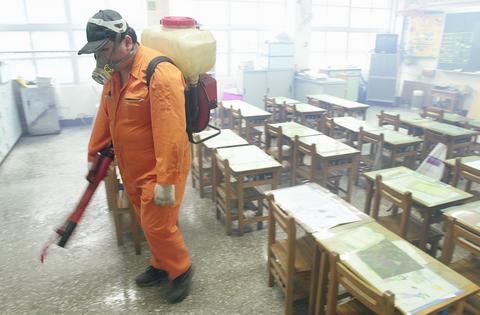Spurred by the growing epidemic of a mysterious respiratory illness, more than two dozen members of the US Congress have intensified their effort to get the George W. Bush administration to press for Taiwan's role in the work of the World Health Organization (WHO) and for Taiwan's inclusion in the global effort to combat the illness.
Led by the co-chairman of the Congressional Taiwan Caucus and by Taiwan-born Oregon Congressman David Wu (
"We are deeply disturbed that one of the nations most affected by this outbreak was denied assistance when it requested help from WHO to diagnose and treat suspected cases of SARS. Despite the health perils posed to 23 million Taiwanese people, the WHO has repeatedly rejected Taiwan's plea for help and has placed the health of an entire nation in jeopardy," the letter said.

PHOTO: GEORGE TSORNG, TAIPEI TIMES
"It is unconscionable that instead of focusing on the health needs of the Taiwanese people, the WHO has based its decision on politics and China's short-sighted rejection of Taiwan's membership in the WHO," the letter said.
The congressmen urged Powell and the administration to secure a position for Taiwan in the Global Outbreak Alert and Response Network, which the WHO set up to coordinate the international efforts to fight SARS.
"It is critical to the health and well-being of the Taiwanese people and the entire international community that Taiwan not be left out of the international effort to identify and treat this deadly virus," they said.
They pointed out that crisis "highlights the urgency" surrounding Taiwan's bid to gain observer status in the WHO's World Health Assembly in Geneva in May. They repeated earlier pleas to Powell to "make a clear and uncompromising declaration of US support" for Taiwan's role in the assembly and to instruct the US delegation to the meeting to speak out on the floor of the assembly in favor of Taiwan's observer status.
The letter comes less than three weeks after the House of Representatives voted unanimously for legislation urging the administration to find a way to secure Taiwan's participation in the assembly. The legislation was sent on to the Senate. While the Senate has not set a date for a vote, Taiwan supporters expect the chamber to ack quickly on the bill, sending it to the president for his signature.
Last month, 64 members of the Taiwan Caucus sent another letter to Powell on the subject, expressing disappointment with the administration's failure to act aggressively last year and urging a stronger effort this time around.

The High Prosecutors’ Office yesterday withdrew an appeal against the acquittal of a former bank manager 22 years after his death, marking Taiwan’s first instance of prosecutors rendering posthumous justice to a wrongfully convicted defendant. Chu Ching-en (諸慶恩) — formerly a manager at the Taipei branch of BNP Paribas — was in 1999 accused by Weng Mao-chung (翁茂鍾), then-president of Chia Her Industrial Co, of forging a request for a fixed deposit of US$10 million by I-Hwa Industrial Co, a subsidiary of Chia Her, which was used as collateral. Chu was ruled not guilty in the first trial, but was found guilty

DEADLOCK: As the commission is unable to forum a quorum to review license renewal applications, the channel operators are not at fault and can air past their license date The National Communications Commission (NCC) yesterday said that the Public Television Service (PTS) and 36 other television and radio broadcasters could continue airing, despite the commission’s inability to meet a quorum to review their license renewal applications. The licenses of PTS and the other channels are set to expire between this month and June. The National Communications Commission Organization Act (國家通訊傳播委員會組織法) stipulates that the commission must meet the mandated quorum of four to hold a valid meeting. The seven-member commission currently has only three commissioners. “We have informed the channel operators of the progress we have made in reviewing their license renewal applications, and

‘DENIAL DEFENSE’: The US would increase its military presence with uncrewed ships, and submarines, while boosting defense in the Indo-Pacific, a Pete Hegseth memo said The US is reorienting its military strategy to focus primarily on deterring a potential Chinese invasion of Taiwan, a memo signed by US Secretary of Defense Pete Hegseth showed. The memo also called on Taiwan to increase its defense spending. The document, known as the “Interim National Defense Strategic Guidance,” was distributed this month and detailed the national defense plans of US President Donald Trump’s administration, an article in the Washington Post said on Saturday. It outlines how the US can prepare for a potential war with China and defend itself from threats in the “near abroad,” including Greenland and the Panama

Taiwan People’s Party (TPP) Chairman Huang Kuo-chang (黃國昌) yesterday appealed to the authorities to release former Taipei mayor Ko Wen-je (柯文哲) from pretrial detention amid conflicting reports about his health. The TPP at a news conference on Thursday said that Ko should be released to a hospital for treatment, adding that he has blood in his urine and had spells of pain and nausea followed by vomiting over the past three months. Hsieh Yen-yau (謝炎堯), a retired professor of internal medicine and Ko’s former teacher, said that Ko’s symptoms aligned with gallstones, kidney inflammation and potentially dangerous heart conditions. Ko, charged with